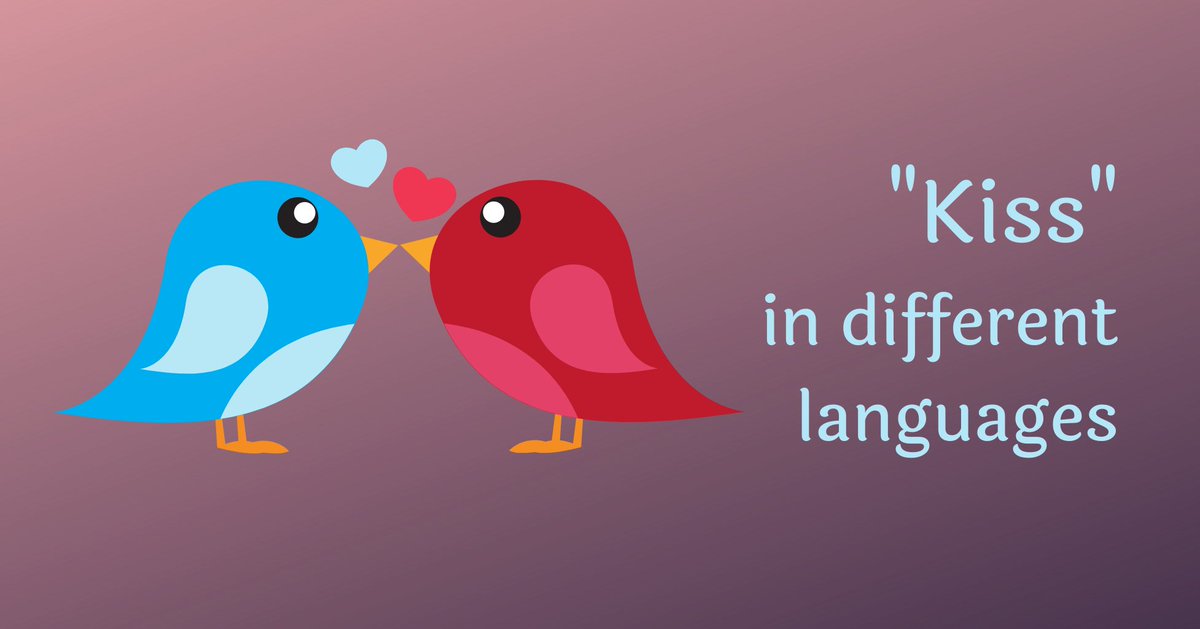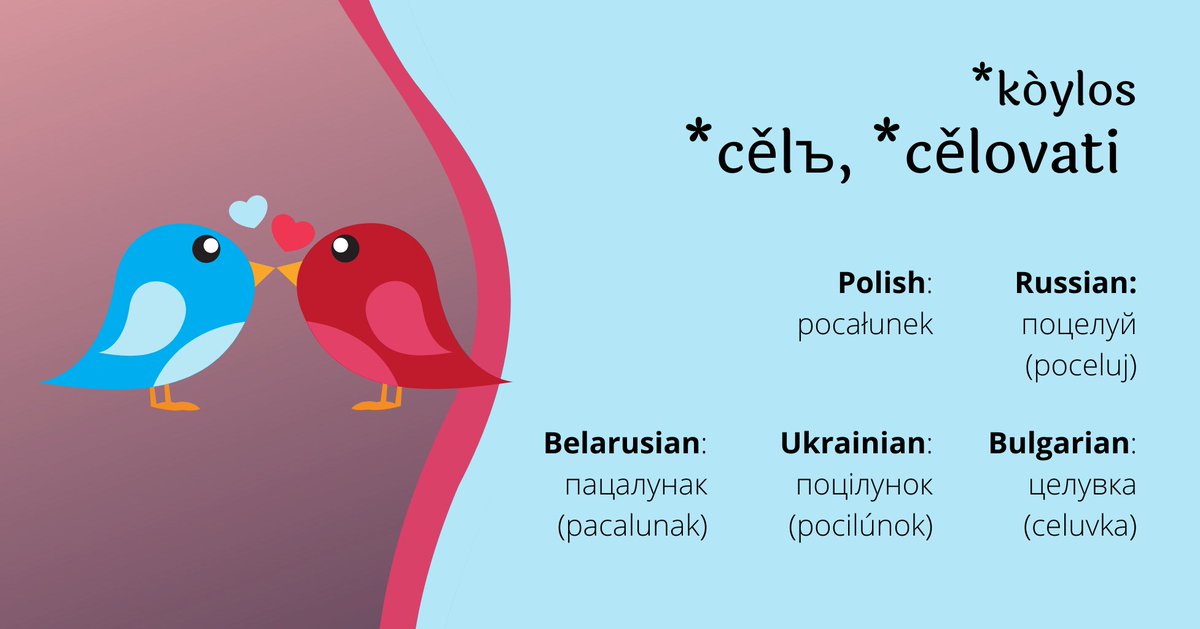It& #39;s #InternationalKissingDay. Not an official day, but a good enough reason for me to create a language thread on the word "kiss" in different languages. So let& #39;s start!  https://abs.twimg.com/emoji/v2/... draggable="false" alt="👇" title="Rückhand Zeigefinger nach unten" aria-label="Emoji: Rückhand Zeigefinger nach unten">
https://abs.twimg.com/emoji/v2/... draggable="false" alt="👇" title="Rückhand Zeigefinger nach unten" aria-label="Emoji: Rückhand Zeigefinger nach unten">
"Kiss" in Slavic languages:
1) from Proto-Slavic *cělovati (to greet; to kiss), from *cělъ (whole), itself from P-I-E *kóylos (whole, healthy), due to the belief that a kiss has the healing power:
1) from Proto-Slavic *cělovati (to greet; to kiss), from *cělъ (whole), itself from P-I-E *kóylos (whole, healthy), due to the belief that a kiss has the healing power:
Similar to that:
from Proto-Germanic *sōnō, *swōnō (“appeasement; reconciliation; atonement; sacrifice”), from Proto-Indo-European *swā-n- (“healthy; whole; active; vigorous”)
 https://abs.twimg.com/emoji/v2/... draggable="false" alt="🇳🇱" title="Flagge der Niederlande" aria-label="Emoji: Flagge der Niederlande"> zoen
https://abs.twimg.com/emoji/v2/... draggable="false" alt="🇳🇱" title="Flagge der Niederlande" aria-label="Emoji: Flagge der Niederlande"> zoen
Dutch also has "kus", listed with other Germanic words for "kiss" in this thread
from Proto-Germanic *sōnō, *swōnō (“appeasement; reconciliation; atonement; sacrifice”), from Proto-Indo-European *swā-n- (“healthy; whole; active; vigorous”)
Dutch also has "kus", listed with other Germanic words for "kiss" in this thread
"Kiss" in other Slavic languages:
2) from Proto-Slavic *ľubiti (to love):
 https://abs.twimg.com/emoji/v2/... draggable="false" alt="🇸🇮" title="Flagge von Slowenien" aria-label="Emoji: Flagge von Slowenien"> poljub
https://abs.twimg.com/emoji/v2/... draggable="false" alt="🇸🇮" title="Flagge von Slowenien" aria-label="Emoji: Flagge von Slowenien"> poljub
 https://abs.twimg.com/emoji/v2/... draggable="false" alt="🇭🇷" title="Flagge von Kroatien" aria-label="Emoji: Flagge von Kroatien">
https://abs.twimg.com/emoji/v2/... draggable="false" alt="🇭🇷" title="Flagge von Kroatien" aria-label="Emoji: Flagge von Kroatien"> https://abs.twimg.com/emoji/v2/... draggable="false" alt="🇷🇸" title="Flagge von Serbien" aria-label="Emoji: Flagge von Serbien">
https://abs.twimg.com/emoji/v2/... draggable="false" alt="🇷🇸" title="Flagge von Serbien" aria-label="Emoji: Flagge von Serbien"> https://abs.twimg.com/emoji/v2/... draggable="false" alt="🇧🇦" title="Flagge von Bosnien und Herzegowina" aria-label="Emoji: Flagge von Bosnien und Herzegowina"> poljubac
https://abs.twimg.com/emoji/v2/... draggable="false" alt="🇧🇦" title="Flagge von Bosnien und Herzegowina" aria-label="Emoji: Flagge von Bosnien und Herzegowina"> poljubac
(the main meaning of "ljubiti" today is "to kiss" but the meaning "to love" is still used in songs)
3)
 https://abs.twimg.com/emoji/v2/... draggable="false" alt="🇸🇰" title="Flagge der Slowakei" aria-label="Emoji: Flagge der Slowakei"> bozk
https://abs.twimg.com/emoji/v2/... draggable="false" alt="🇸🇰" title="Flagge der Slowakei" aria-label="Emoji: Flagge der Slowakei"> bozk
 https://abs.twimg.com/emoji/v2/... draggable="false" alt="🇲🇰" title="Flagge von Mazedonien" aria-label="Emoji: Flagge von Mazedonien"> бакнеж (baknež)
https://abs.twimg.com/emoji/v2/... draggable="false" alt="🇲🇰" title="Flagge von Mazedonien" aria-label="Emoji: Flagge von Mazedonien"> бакнеж (baknež)
 https://abs.twimg.com/emoji/v2/... draggable="false" alt="🇨🇿" title="Flagge der Tschechischen Republik" aria-label="Emoji: Flagge der Tschechischen Republik"> polibek
https://abs.twimg.com/emoji/v2/... draggable="false" alt="🇨🇿" title="Flagge der Tschechischen Republik" aria-label="Emoji: Flagge der Tschechischen Republik"> polibek
(I found no etymology for these)
2) from Proto-Slavic *ľubiti (to love):
(the main meaning of "ljubiti" today is "to kiss" but the meaning "to love" is still used in songs)
3)
(I found no etymology for these)
"Kiss" in Germanic languages:
Ultimately from Proto-Germanic *kussaz, which is probably onomatopeic
 https://abs.twimg.com/emoji/v2/... draggable="false" alt="🇬🇧" title="Flagge des Vereinigten Königreiches" aria-label="Emoji: Flagge des Vereinigten Königreiches"> kiss
https://abs.twimg.com/emoji/v2/... draggable="false" alt="🇬🇧" title="Flagge des Vereinigten Königreiches" aria-label="Emoji: Flagge des Vereinigten Königreiches"> kiss
 https://abs.twimg.com/emoji/v2/... draggable="false" alt="🇳🇴" title="Flagge von Norwegen" aria-label="Emoji: Flagge von Norwegen">
https://abs.twimg.com/emoji/v2/... draggable="false" alt="🇳🇴" title="Flagge von Norwegen" aria-label="Emoji: Flagge von Norwegen"> https://abs.twimg.com/emoji/v2/... draggable="false" alt="🇸🇪" title="Flagge von Schweden" aria-label="Emoji: Flagge von Schweden"> kyss
https://abs.twimg.com/emoji/v2/... draggable="false" alt="🇸🇪" title="Flagge von Schweden" aria-label="Emoji: Flagge von Schweden"> kyss
 https://abs.twimg.com/emoji/v2/... draggable="false" alt="🇩🇰" title="Flagge von Dänemark" aria-label="Emoji: Flagge von Dänemark"> kys
https://abs.twimg.com/emoji/v2/... draggable="false" alt="🇩🇰" title="Flagge von Dänemark" aria-label="Emoji: Flagge von Dänemark"> kys
 https://abs.twimg.com/emoji/v2/... draggable="false" alt="🇳🇱" title="Flagge der Niederlande" aria-label="Emoji: Flagge der Niederlande"> kus
https://abs.twimg.com/emoji/v2/... draggable="false" alt="🇳🇱" title="Flagge der Niederlande" aria-label="Emoji: Flagge der Niederlande"> kus
 https://abs.twimg.com/emoji/v2/... draggable="false" alt="🇩🇪" title="Flagge von Deutschland" aria-label="Emoji: Flagge von Deutschland"> Kuss
https://abs.twimg.com/emoji/v2/... draggable="false" alt="🇩🇪" title="Flagge von Deutschland" aria-label="Emoji: Flagge von Deutschland"> Kuss
(but also from a Slavic language: Busserl)
 https://abs.twimg.com/emoji/v2/... draggable="false" alt="🇱🇺" title="Flagge von Luxemburg" aria-label="Emoji: Flagge von Luxemburg"> Kuss
https://abs.twimg.com/emoji/v2/... draggable="false" alt="🇱🇺" title="Flagge von Luxemburg" aria-label="Emoji: Flagge von Luxemburg"> Kuss
(but also Bees, ultimately from Latin "basio")
 https://abs.twimg.com/emoji/v2/... draggable="false" alt="🇮🇸" title="Flagge von Island" aria-label="Emoji: Flagge von Island"> koss
https://abs.twimg.com/emoji/v2/... draggable="false" alt="🇮🇸" title="Flagge von Island" aria-label="Emoji: Flagge von Island"> koss
Ultimately from Proto-Germanic *kussaz, which is probably onomatopeic
(but also from a Slavic language: Busserl)
(but also Bees, ultimately from Latin "basio")
"Kiss" in Romance languages:
1) from Latin basium, which is from P-I-E *bu
 https://abs.twimg.com/emoji/v2/... draggable="false" alt="🇮🇹" title="Flagge von Italien" aria-label="Emoji: Flagge von Italien"> bacio
https://abs.twimg.com/emoji/v2/... draggable="false" alt="🇮🇹" title="Flagge von Italien" aria-label="Emoji: Flagge von Italien"> bacio
 https://abs.twimg.com/emoji/v2/... draggable="false" alt="🇪🇸" title="Flagge von Spanien" aria-label="Emoji: Flagge von Spanien"> beso
https://abs.twimg.com/emoji/v2/... draggable="false" alt="🇪🇸" title="Flagge von Spanien" aria-label="Emoji: Flagge von Spanien"> beso
 https://abs.twimg.com/emoji/v2/... draggable="false" alt="🇫🇷" title="Flagge von Frankreich" aria-label="Emoji: Flagge von Frankreich"> baiser
https://abs.twimg.com/emoji/v2/... draggable="false" alt="🇫🇷" title="Flagge von Frankreich" aria-label="Emoji: Flagge von Frankreich"> baiser
 https://abs.twimg.com/emoji/v2/... draggable="false" alt="🇵🇹" title="Flagge von Portugal" aria-label="Emoji: Flagge von Portugal"> beijo
https://abs.twimg.com/emoji/v2/... draggable="false" alt="🇵🇹" title="Flagge von Portugal" aria-label="Emoji: Flagge von Portugal"> beijo
 https://abs.twimg.com/emoji/v2/... draggable="false" alt="🇦🇩" title="Flagge von Andorra" aria-label="Emoji: Flagge von Andorra"> bes
https://abs.twimg.com/emoji/v2/... draggable="false" alt="🇦🇩" title="Flagge von Andorra" aria-label="Emoji: Flagge von Andorra"> bes
2) Catalan also has "petó" for "kiss", which comes from "pet", used colloquially to mean "fart". An odd connection
1) from Latin basium, which is from P-I-E *bu
2) Catalan also has "petó" for "kiss", which comes from "pet", used colloquially to mean "fart". An odd connection
"Kiss" in Romanian:
1) from săruta (to kiss),
itself from Latin salutare (safety; health, welfare, prosperity), present active infinitive of "saluto" (I keep safe; I greet, salute,...)
 https://abs.twimg.com/emoji/v2/... draggable="false" alt="🇷🇴" title="Flagge von Rumänien" aria-label="Emoji: Flagge von Rumänien"> sărut
https://abs.twimg.com/emoji/v2/... draggable="false" alt="🇷🇴" title="Flagge von Rumänien" aria-label="Emoji: Flagge von Rumänien"> sărut
1) from săruta (to kiss),
itself from Latin salutare (safety; health, welfare, prosperity), present active infinitive of "saluto" (I keep safe; I greet, salute,...)
"Kiss" in Uralic languages:
1) from "suu" (mouth) + "-kko"
 https://abs.twimg.com/emoji/v2/... draggable="false" alt="🇫🇮" title="Flagge von Finnland" aria-label="Emoji: Flagge von Finnland"> suukko
https://abs.twimg.com/emoji/v2/... draggable="false" alt="🇫🇮" title="Flagge von Finnland" aria-label="Emoji: Flagge von Finnland"> suukko
2) from https://abs.twimg.com/emoji/v2/... draggable="false" alt="🇫🇮" title="Flagge von Finnland" aria-label="Emoji: Flagge von Finnland"> "suudela"/
https://abs.twimg.com/emoji/v2/... draggable="false" alt="🇫🇮" title="Flagge von Finnland" aria-label="Emoji: Flagge von Finnland"> "suudela"/ https://abs.twimg.com/emoji/v2/... draggable="false" alt="🇪🇪" title="Flagge von Estland" aria-label="Emoji: Flagge von Estland"> "suudelma" (to kiss) + a suffix deriving nouns from verbs
https://abs.twimg.com/emoji/v2/... draggable="false" alt="🇪🇪" title="Flagge von Estland" aria-label="Emoji: Flagge von Estland"> "suudelma" (to kiss) + a suffix deriving nouns from verbs
 https://abs.twimg.com/emoji/v2/... draggable="false" alt="🇫🇮" title="Flagge von Finnland" aria-label="Emoji: Flagge von Finnland"> suudelma
https://abs.twimg.com/emoji/v2/... draggable="false" alt="🇫🇮" title="Flagge von Finnland" aria-label="Emoji: Flagge von Finnland"> suudelma
 https://abs.twimg.com/emoji/v2/... draggable="false" alt="🇪🇪" title="Flagge von Estland" aria-label="Emoji: Flagge von Estland"> suudlus
https://abs.twimg.com/emoji/v2/... draggable="false" alt="🇪🇪" title="Flagge von Estland" aria-label="Emoji: Flagge von Estland"> suudlus
3) back-formation from csókol (to kiss)
 https://abs.twimg.com/emoji/v2/... draggable="false" alt="🇭🇺" title="Flagge von Ungarn" aria-label="Emoji: Flagge von Ungarn"> csók
https://abs.twimg.com/emoji/v2/... draggable="false" alt="🇭🇺" title="Flagge von Ungarn" aria-label="Emoji: Flagge von Ungarn"> csók
1) from "suu" (mouth) + "-kko"
2) from
3) back-formation from csókol (to kiss)
"Kiss" in Baltic languages:
1) from the same stem as the verb skūpstīt (to kiss), itself from sūkstīt (to suck repeatedly), the iterative form of sūkt (to suck)
 https://abs.twimg.com/emoji/v2/... draggable="false" alt="🇱🇻" title="Flagge von Lettland" aria-label="Emoji: Flagge von Lettland"> skūpsts
https://abs.twimg.com/emoji/v2/... draggable="false" alt="🇱🇻" title="Flagge von Lettland" aria-label="Emoji: Flagge von Lettland"> skūpsts
2)
 https://abs.twimg.com/emoji/v2/... draggable="false" alt="🇱🇹" title="Flagge von Litauen" aria-label="Emoji: Flagge von Litauen"> bučinys
https://abs.twimg.com/emoji/v2/... draggable="false" alt="🇱🇹" title="Flagge von Litauen" aria-label="Emoji: Flagge von Litauen"> bučinys
the verb "bučiuoti" (to kiss) is from Proto-Indo-European *bus- (to kiss)
1) from the same stem as the verb skūpstīt (to kiss), itself from sūkstīt (to suck repeatedly), the iterative form of sūkt (to suck)
2)
the verb "bučiuoti" (to kiss) is from Proto-Indo-European *bus- (to kiss)
"Kiss" in Albanian and Irish :P
 https://abs.twimg.com/emoji/v2/... draggable="false" alt="🇦🇱" title="Flagge von Albanien" aria-label="Emoji: Flagge von Albanien"> puthje
https://abs.twimg.com/emoji/v2/... draggable="false" alt="🇦🇱" title="Flagge von Albanien" aria-label="Emoji: Flagge von Albanien"> puthje
gerund of puth (I kiss), which is from Proto-Albanian *putsa, from P-I-E *puḱ- (press together)
 https://abs.twimg.com/emoji/v2/... draggable="false" alt="🇮🇪" title="Flagge von Irland" aria-label="Emoji: Flagge von Irland"> póg
https://abs.twimg.com/emoji/v2/... draggable="false" alt="🇮🇪" title="Flagge von Irland" aria-label="Emoji: Flagge von Irland"> póg
from Old Irish póc, from Latin "(dare) pācem" (to give peace), originally a kiss as a sign of peace during a mass
gerund of puth (I kiss), which is from Proto-Albanian *putsa, from P-I-E *puḱ- (press together)
from Old Irish póc, from Latin "(dare) pācem" (to give peace), originally a kiss as a sign of peace during a mass

 Read on Twitter
Read on Twitter " title="It& #39;s #InternationalKissingDay. Not an official day, but a good enough reason for me to create a language thread on the word "kiss" in different languages. So let& #39;s start! https://abs.twimg.com/emoji/v2/... draggable="false" alt="👇" title="Rückhand Zeigefinger nach unten" aria-label="Emoji: Rückhand Zeigefinger nach unten">" class="img-responsive" style="max-width:100%;"/>
" title="It& #39;s #InternationalKissingDay. Not an official day, but a good enough reason for me to create a language thread on the word "kiss" in different languages. So let& #39;s start! https://abs.twimg.com/emoji/v2/... draggable="false" alt="👇" title="Rückhand Zeigefinger nach unten" aria-label="Emoji: Rückhand Zeigefinger nach unten">" class="img-responsive" style="max-width:100%;"/>



